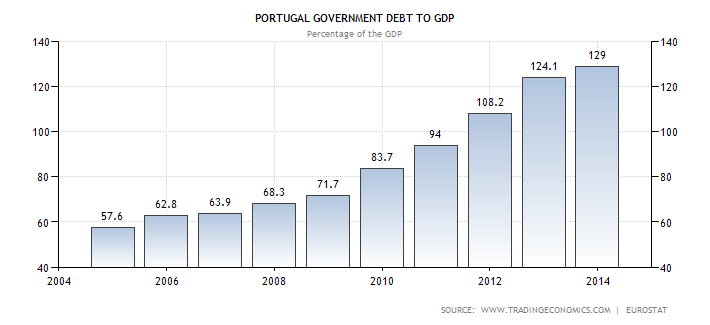Capitalism gets into deep trouble when the price of financial assets becomes completely disconnected from economic reality and common sense. What ensues is rampant speculation in which financial gamblers careen from one hot money play to the next, leaving the financial system distorted and unstable—a proverbial train wreck waiting to happen.
That’s where we are now. And nowhere is this more evident than in the absurd run-up in the price of European sovereign debt since the Euro-crisis peaked in mid-2012. In that regard, perhaps Portugal is the poster-boy. It’s fiscal, financial and economic indicators are still deep in the soup, yet its government bond prices have soared in a triumphal arc skyward.
Unfortunately, the recent crash landing of its largest conglomerate and financial group (Espirito Santo Group) is a stark remainder that its cartel-ridden, import-addicted, debt-besotted economy is not even close to being fixed. Notwithstanding the false claims of Brussels and Lisbon that it has successfully “graduated†from its EC bailout, the truth is that the risk of default embedded in its sovereign debt has not been reduced by an iota.
At the time of the 2011-2012 crisis, its central government was already sliding rapidly into a debt trap with a ratio of just under 100%. Self-evidently, the nation’s so-called EC bailout has only made its public debt burden dramatically worse. Today Portugal’s debt to GDP ratio is 129% and there is no sign of a turnaround.Â

But that has not deterred the rambunctious speculators in peripheral sovereign debt. Since mid-2012 and Draghi’s “whatever it takes†ukase, the price of Portugal’s public debt has soared. This means that leveraged speculators—-and they are all leveraged on repo or similar forms of hypothecated borrowings—-have made a killing, harvesting triple-digit gains on the thin slice of non-borrowed capital they actually have at risk in these carry trades.
As shown below, in response to this central bank induced bond buying campaign by fast money speculators, the 10-year Portuguese government bond yield has experienced a stunning plunge from 15% to 4% during the last 24 months. Among other things, this dramatic improvement virtually overnight in its fiscal financing costs has taught Portugal’s government a dangerously false lesson. Namely, that in the face of unsustainable fiscal profligacy all its takes is a little budgetary sleight of hand and fake austerity. In fact, nearly all of its fiscal improvement is owing to the one-time sale of state assets including the airport operator and various public utilities under financial arrangement which amount to little more than off-budget borrowing.Â

Moreover, regardless of the quality of its fiscal recovery measures, the sharp drop in its bond yield would ordinarily at least imply that Portugal has turned its chronic fiscal deficits on a dime, but that is not remotely the case, either.  Portugal has been burying itself in red ink for decades and despite being down from their crisis peak of 10% of GDP in 2010-2011, government deficits, as shown below, are still running at the historic rate of 5% of GDP and will be lucky to break below that level in 2014 or anytime soon thereafter.

